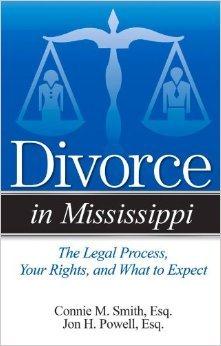These answers are based on Mississippi law. Each state has its own unique rules relating to family matters.
How do I get a divorce in Mississippi ?
At least one of the parties must have lived in Mississippi for six (6) months. If not, then Mississippi courts do not have the authority to grant a divorce between the parties.
There are two (2) methods of divorce in Mississippi. The first is based on Irreconcilable Differences between the parties. This is commonly known as a “No-Fault Divorce”. In order to enter into a no-fault divorce, both parties must voluntarily join in a petition requesting a divorce.
The second method is a contested divorce based on the fault of one of the parties. The party requesting the divorce must prove that the spouse is guilty of at least one of the twelve possible grounds for divorce. These specific grounds are set out by statute and include adultery, habitual drunkenness, habitual use of drugs, and habitual cruel and inhuman treatment.
Do I have to have a lawyer to get a divorce?
No, an attorney is not required to file a joint complaint for divorce in Mississippi. However, there are numerous risks in preparing any legal document without an understanding of Mississippi law. This is especially true of a divorce. If the divorce is not prepared according to statutory requirements it will not be valid. In the best case scenario an improper divorce will be denied finalization by the Chancellor. In a worst case scenario it could be declared void years later after the parties believed it was final and have moved on to other marriages or relationships.
Additionally, a divorce is not easily modified once it has been entered by the Court. Therefore, if the parties fail to properly address issues within the divorce they may not be able to do so later. Simply stated, a divorce is a major undertaking that will likely affect both parties and the children for a long time. It should not be something entered into without proper legal counsel.
What is the process for getting an Irreconcilable Differences or “No-Fault” divorce?
In a true no-fault divorce, the parties agree on all the issues relating to their divorce including property division, debt responsibility, child custody, child support and visitation. To begin the process a Joint Complaint for divorce must be signed by both parties in the presence of notary public and filed with the chancery clerk of the county where the parties reside. This document contains basic information identifying the parties and notifying the court of each party’s agreement to enter into the divorce. A separate document containing the specific agreement between the parties is also filed. This is sometimes called a Property Settlement Agreement.
These documents must remain on file for sixty (60) days before the Chancellor will grant a divorce. During this 60 day period, the parties are still married for all legal purposes. Also, at any time during this waiting period, either party can withdraw his or her consent to the divorce and stop the process.
After the expiration of the 60 day waiting period, the divorce can be presented to the Chancellor for approval. The divorce is not finalized until the Chancellor executes a final order. This means that the parties are not automatically divorced on the 61st day but remain married until the order for divorce is signed and filed with the chancery clerk.
What are the grounds for divorce in Mississippi?
As set forth in Mississippi Code Section 93-5-1 and 93-5-2, they are: natural impotency, adultery, sentenced to penitentiary without being pardoned, continued willful desertion for 1 year, habitual drunkenness, habitual and excessive use of drugs, habitual cruel and inhuman treatment, insanity or idiocy at the time of the marriage if the party complaining of same did not know of the mental infirmity, marriage to another person at the time of the pretended marriage, pregnancy of the wife by another at the time of the marriage if the husband did not know of the pregnancy, incest, incurable insanity, and irreconcilable differences.
What information will my attorney need from me at my initial divorce consultation?
Your attorney will want to know basic information such as names and addresses of the parties, names of the children and their birth dates, the date and location of the marriage, and the date and location of the separation of the parties. He or she will also need to know what assets the parties own and the debts owed. This includes assets titled solely in one of the party’s names.
Click here to view and print our Divorce Client Questionnaire
How can I get a legal separation from my spouse?
There is no such thing as a “legal separation” in Mississippi - it simply does not exist.
How does the Court divide assets in a divorce in Mississippi?
The Court uses a process called “Equitable Distribution”. This system is premised on the idea that the division of marital assets should be fair but not necessarily equal. In making this determination the court considers the following, commonly known as the Ferguson factors:
- Substantial contribution to the accumulation of the property. Factors to be considered in determining contributions are as follows:
- Direct or indirect economic contribution to the acquisition of property;
- Contribution to the stability and harmony of the marital and family relationships as measured by quality, quantity of time spent on family duties and duration of the marriage; and
- Contribution to the education, training or other accomplishment bearing on the earning power of the spouse accumulating the assets.
- The degree to which each spouse has expended, withdrawn or otherwise disposed of marital assets and any prior distribution of such assets by agreement, decree or otherwise.
- The market value and the emotional value of the assets subject to the distribution.
- The value of assets not ordinarily, absent equitable facts to the contrary, subject to such distribution, such as property brought to the marriage by the parties and property acquired by inheritance or inter vivos gift by or to an individual spouse;
- Tax and other economic consequences, and contractual or legal consequences to third parties, of the proposed distribution;
- The extent to which property division may, with equity to both parties, be utilized to eliminate periodic payments and other potential sources of future friction between the parties;
- The needs of the parties for financial security with due regard to the combination of assets, income and earning capacity; and
- Any other factor which in equity should be considered.
What are the types of child custody in Mississippi?
A determination of child custody should consist of a finding of both legal custody and the physical custody of the children. Legal custody determines who has the right to make legal decisions on behalf of the child. This would include deciding where to enroll the child in school and making determinations relating to medical treatment. This authority can be awarded jointly to both parents or solely to one parent.
Physical custody relates to who the child physically lives with. Physical custody can also be awarded solely to one parent or to both parents jointly. Joint physical custody usually means that the child is with both parents an equal amount of time. While this may seem “fair” to the parents, it is usually upsetting to the child’s sense of stability and is frowned upon by most Judges.
How does the Court decide who gets custody of the children?
The Court’s paramount concern in determining custody is the ‘best interest of the children’. To guide them in making this determination the Court considers the following known as the Albright factors:
- age of the child;
- health of the child;
- sex of the child;
- a determination of the parent that has had the continuity of care prior to the separation;
- which parent has the best parenting skills and which has the willingness and capacity to provide primary child care;
- the employment of the parent and responsibilities of that employment;
- physical and mental health and age of the parents;
- emotional ties of parent and child;
- moral fitness of the parents;
- the home, school and community record of the child;
- the preference of the child at the age sufficient to express a preference by law;
- stability of the home environment and employment of each parent;
- other facts relevant to the parent-child relationship.
What visitation is normally granted to a non-custodial parent?
Visitation can be awarded in any manner which suits the needs of the parties and the children. However, the standard visitation is as follows:
How does the Court decide how much child support to award?
The amount of child support is generally based on the income of the payor and the number of children. If the payor has an annual income of less than $50,000.00, he/she will pay a percentage of his/ her adjusted gross income. To determine adjusted gross income, you subtract taxes, social security, mandatory retirement and disability payments/contributions from the gross income. The percentages of support are as follows:
1 child - 14%
2 children - 20%
3 children - 22%
4 children - 24%
5 or more - 26%
Of course this is just a guideline and the Court will consider special needs of the child, prior child support obligations of the payor, and any other relevant factors.
How can child support be changed?
The party requesting the change must show a “material change in circumstances” since the entry of the most recent order awarding child support. This means that the situation must have changed since the last order. The most common circumstances that constitute a change recognized by the Court is the increased needs of the children or an involuntary reduction of income by payor.
Can a Court order a parent to pay for a child’s college education expenses?
Yes. However, the duty to pay for a child’s college education is not absolute. The child must earn the privilege of getting their college expenses paid for. The child’s behavior and attitude toward a parent may affect the parent’s obligation to pay for college education expenses. The Mississippi Supreme Court stated: “The parental duty is not absolute, however, but is dependent upon the proof and circumstances of each case. It is dependent, not only on the child’s aptitude and qualifications for college, but on whether the child’s behavior toward, and relationship with the father, makes the child worthy of the additional effort and financial burden that will be placed on him. Sending children to college is expensive and can cause much sacrifice on the part of parents. It cannot ordinarily be demanded, but must be earned by children through respect for their parents, love, affection and appreciation of parental efforts. . .” Hambrick, 382 So.2d 474 (Miss. 1980).
Can the Court order that a parent pay for a child’s college education beyond the age of 21?
No. Unless the parent otherwise agrees in writing to pay for the child’s college beyond the age of 21, the obligation to pay for college stops at age 21. The Court does not have any authority to order post-majority support beyond what the husband and wife have specifically contracted to do.
When does child support stop?
Unless otherwise agreed, child support stops when the child reaches the age of 21, or earlier if the child is emancipated. A child shall be deemed emancipated if the child: (1) reaches the age of 21; or (2) gets married; or (3) joins the military and serves on a full-time basis; or (4) is convicted of a felony and incarcerated for two or more years. Further, the court may determine that a child is emancipated if the child: (1) discontinues full-time enrollment in school if the child is 18 (unless the child is disabled); or (2) voluntarily moves out of the custodial parent’s home, establishes independent living arrangements, obtains full-time employment and discontinues the pursuit of an education prior to reaching 21; or (3) cohabits with another person without the consent and approval of the non-custodial parent.
How does the Court decide whether to award alimony?
The most important factor in determining whether one party is entitled to an award of alimony is the length of the marriage. Generally speaking, the shorter the marriage the less likely the Court is to award alimony. The other factors which are considered are:
- the income and expenses of the parties;
- the earning capacities of the parties;
- the needs of each party;
- the obligations and assets of each party;
- the length of the marriage;
- the presence or absence of minor children in the home, which may require that one or both of the parties either pay, or personally provide, child care;
- the age of the parties;
- the standard of living of the parties, both during the marriage and at the time of the support determination;
- the tax consequences of the spousal support order;
- fault or misconduct;
- wasteful dissipation of assets by either party; or
- any other factor deemed by the court to be "just and equitable" in connection with the setting of spousal support.
What are the different types of alimony in Mississippi?
- Lump sum alimony, which is a fixed amount, is final, is considered a property transfer, and cannot be modified, nor is it affected by death (ie. binding on estate) or re-marriage.
- Periodic alimony, which is vested when due, is subject to modification, may be forfeited by the receiving spouse by misconduct, is terminated upon the death of either party or by remarriage or cohabitation of the receiving spouse, is deductible by the payor and taxable as income to the payee.
- Rehabilitative alimony, which is for a fixed period of time, but the amount of the alimony paid is modifiable (i.e. the time period is not modifiable, but the amount is modifiable).
Do grandparents have an equal standing for custody of the children than the parents?
The short answer, with few exceptions, is no.
In a custody dispute between the parents of a child and that child's grandparents, there is a presumption that it is in the best interest of that child to remain with the natural parents. In order to overcome this presumption, there must be a clear showing by the grandparents that the parent has (1) abandoned the child, or (2) the conduct of the parent is so immoral as to be detrimental to the child, or (3) the parent is unfit mentally or otherwise to have the custody of his or her child. See McKee v. Flynt, 630 So2d 44 (Miss. 1993).
Do grandparents have visitation rights?
Not without a court order granting these rights. In certain circumstances grandparents can petition the Court to establish visitation rights with their grandchildren. However, in writing the statute which provides for such a petition, the legislature decided to “punish” grandparents who seek these rights by stating that the Court shall require grandparents (in certain circumstances) to pay the reasonable attorneys fees of the parents in advance and prior to any hearing, regardless of the ultimate outcome of the petition.
Contact Us
Getting a divorce can be complicated with many factors to consider, but we can help you come up with a plan that works. Shows & Smith Law Firm PLLC helps individuals throughout Mississippi find workable solutions to their family disputes. Contact our divorce law firm online or call 601-326-1199 to schedule a FREE 30 minute divorce consultation.





